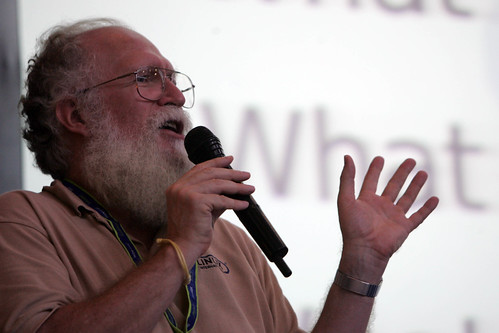Richard Stallman recently wrote a long article entitled “Why “Open Source” misses the point of Free Software“, explaining why free software enthusiasts have to say “free software” rather than “open source“.
Every Free Software activist knows very well this issue, and I did abide by the importance to stand for freedom for years when I was supporting the FSFE Italian chapter’s activities. Recognizing the importance of freedom and stand for it, doesn’t imply the need to not talk about open source, though. Here comes the reason of this post, let’s start with Richard’s words:
These freedoms [the four ones] are vitally important. They are essential, not just for the individual users’ sake, but because they promote social solidarity—that is, sharing and cooperation.
I think it is really important to stress the ultimate goal of free software, just as he clearly pointed out here: sharing and cooperation. Richard dislikes Lakhani and Wolf’s findings on the motivation of free software developers, because apparently only a fraction of them are motivated by the view that software should be free. In his opinion it happens because they surveyed the developers on a site that does not stress the importance of freedom. While I don’t know if he is right or not saying it, I think a better understanding of why firms cooperate on open source projects is important.
An Italian research based upon 146 firms analyzed the role played by different classes of motivations (social, economic and technological) in determining the involvement of different groups of agents in Open Source activities. Here the conclusions:
We find significant differences between the set of motivations of individuals and those of firms. In particular, firms emphasize economic and technological reasons for entering and contributing to Open Source and do not subscribe to many social motivations that are, by contrast, typical of individual programmers. While one might expect these differences, it is interesting to observe that the more pragmatic motivational profiles of firms are accepted in the Free Software community, provided firms comply with the rules of the community.
So individual developers’ and firms’ motivations are inherently different in nature. Reading the variety of the answers comes out that the highest–ranking incentive for using Open Source software seems to be promoting innovation and emancipation from the price and licence policies of large software companies.
Sequential Innovation is the reason to share and cooperate, as seen also in a study conducted on the linux-embedded vertical market, showing that averagely 53% of code is revealed. Participation to a technological club has beneficial effects on firms’ business, because they share risks and costs.
Collaboration is an emerging pattern, and firms approaching software production in terms of sharing and cooperation are Free Software’s good friend. Commercial Open Source, as far as based on participation and fostering communities, is aimed at promoting just the same idea of freedom, no less.
Happy hacking, share and share-alike!
Technorati Tags: Free Software, RichardStallman, Commercial Open Source, Freedom
 Our Community Manager by JJay
Our Community Manager by JJay
 Jon Hall Maddog by
Jon Hall Maddog by  now hiring, by
now hiring, by
Ross Turk 10:01 pm on October 11, 2007 Permalink
Hey Roberto!
When I was Engineering Manager for SourceForge.net, I lobbied for the creation of a Community Manager position. They let me take that position, and it paid dividends almost immediately.
Community management has become a very important part of open source businesses because it provides a way for us to understand how individual contributers work, what’s important to them, and what we can do to make them happy.
Ross
Roberto Galoppini 10:01 am on October 12, 2007 Permalink
Hi Ross,
nice to hear back from you!
I believe a position like yours is pretty unique, you’re a Community Manager taking care of lots of projects.
Tell us something more about your job!
Ciao,
Roberto
Community manager freelance 7:48 pm on January 13, 2012 Permalink
Thanks for sharing ! excuse my bad english i’m an fench guy. It is possible to take your post in order to translate it on my frnech blog? Thanks. Best regards
Roberto Galoppini 8:19 pm on January 17, 2012 Permalink
Feel free to do it, please link to the original website for reference.
Best,
Roberto